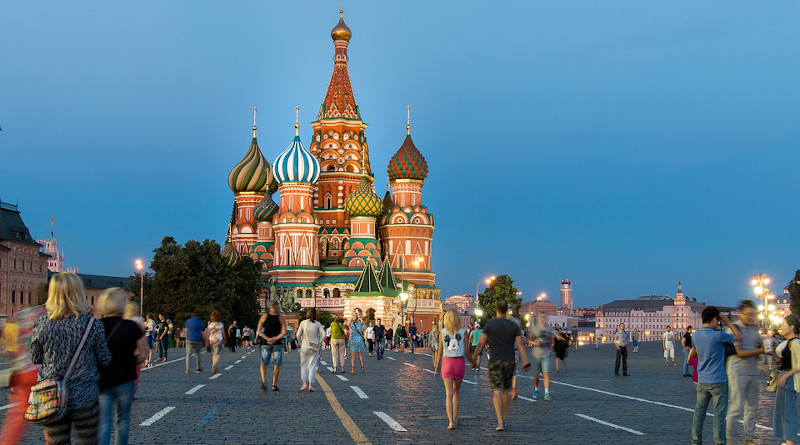Ukraine War Hits Russia’s Tourism Industry – OpEd
Russia’s tourism, both in-bound and out-bound, is severely hit by the war-ravaged crisis that unfolded in the former Soviet republic of Ukraine late February. For more than two years, the tourism industry was affected due to the widespread Covid-19 that shattered the world.
Industry operators say that the impact on tourism due to Russia’s “special military operation” in Ukraine has pushed the United States and Canada, European Union, Australia, New Zealand and many other countries to impose a series of sanctions, which are currently affecting the smooth operation of tourism business.
According to statistics, over these past three years that included the Covid-19 restrictions and Russia-Ukraine crisis, foreign airlines have carried an estimated 128.1 million passengers, but most passengers were stuck due to border closures and repatriated in 2020. As Covid-19 subsided, and the latest volley of sanctions have cut foreign travel especially to the United States and Europe for Russians.
Analysts expect tourism business to develop considerably inside Russia. Russian tourists might instead opt for South America and Caribbean, Asian and African destinations such as Cyprus, Thailand, Turkey, Malta, Maldives, Zanzibar, and Egypt. Russian citizens might not fear a sharp rise in airplane ticket prices, as during the spring and upcoming summer seasons costs are being determined, among other factors, by demand and purchasing power.
Many Russian tourists stranded due to economic sanctions, handicapped by bank withdrawals using international credit card system. Zarina Doguzova at the Russian Federal Agency for Tourism told the local Russian media that nearly 90,000 tourists were repatriated in March.
According to the agency, Egypt has the largest number of packaged tourists from Russia. The repatriation process has been hampered and takes more time due to new Western sanctions targeting the planes expected to be used for special flights from Egypt to Russia. The tour operators struggled to bring back Russian packaged tourists by using different ways, including connecting flights of foreign airlines through third countries from the United Arab Emirates, Turkey, the Maldives and Thailand.
On April 4, Russian Prime Minister Mikhail Mishustin announced that from April 9, Russia would cancel restrictions on flights to 52 countries imposed due to the pandemic, including Argentina, India, China, South Africa, and other friendly countries. It applies to regular and charter flights between Russia and several other foreign countries.
It will take into account the epidemiological situation in individual countries: a previous decision was made to completely lift restrictions on regular and charter flights with Algeria, Argentina, Afghanistan, Bahrain, Bosnia and Herzegovina, Botswana, Brazil, Venezuela, Vietnam, Hong Kong, Egypt and Zimbabwe.
The rest include Israel, India, Indonesia, Jordan, Iraq, Kenya, China, North Korea, Costa Rica, Kuwait, Lebanon, Lesotho, Mauritius, Madagascar, Malaysia, Maldives, Morocco, Mozambique, Moldova, Mongolia, Myanmar, Namibia, Oman, Pakistan, Peru, Saudi Arabia, Seychelles, Serbia, Syria, Thailand, Tanzania, Tunisia, Turkey, Uruguay, Fiji, Philippines, Sri Lanka, Ethiopia, South Africa, and Jamaica.
The protracted Ukraine war threatens several tourist destinations that rely on Russian visitors. Turkey, Uzbekistan, the UAE, Tajikistan, Armenia, Greece, Egypt, Kazakhstan, and Cyprus are among the top 25 countries for outbound Russian tourism by flight capacity, according to Mabrian Technologies, an intelligence platform for the tourism industry.
For instance, Egypt’s economy relies heavily on tourism from Russia and Ukraine, with the two countries accounting for roughly one-third of all visitors each year. Egypt is working to open tourism markets, particularly for Germany, England, the Czech Republic, Italy, and Switzerland, following the lifting of travel restrictions to Egypt.
Thousands of Russian tourists visit Thailand’s beach resorts. The Russia-Ukraine crisis with Europe might further push Russian tourists for popular destinations in Asia and a few destinations in Africa. While Covid-19 restrictions have been lifted, not all these countries are considered as popular destinations for Russian tourists. Russia is looking to develop and promote domestic tourism.
According to statistics, Russian tourists spent over $300 billion abroad over the past 20 years, and their money could build domestic tourism infrastructure. Experts also argue that the Russian tourism infrastructure has been demonstrating some growth over the past year, and it is important not to lose this pace under the current circumstances in the world.
Federal Agency for Tourism, which promotes tours both domestic and foreign, underscored steps being taken by the Russian government to put tourism on track including subsidy offers for local destinations, an effort towards encouraging and promoting domestic tourism, which are safe and have comfortable conditions for Russian tourists, during the forthcoming seasons.
Russian government’s latest package of measures to support the economy in the face of sanctions will address the tourism industry and a number of other sectors, and it provides for tax incentives, Federation Council Deputy Speaker Nikolai Zhuravlev said this month.
According to the Association of Tour Operators of Russia (ATOR), external tourism will steadily pick up despite the current international situation and the rising dollar and euro exchange rates, and the decline in the share of foreign tours in the volume of sales during February and March, during the months of the Russia-Ukraine crisis.
Russia’s membership has been stripped off international organizations, the latest was the United Nations Human Rights Council. On March 8, the Executive Council proposed holding an extraordinary assembly to consider a possible suspension of Russia’s membership from the United Nations World Tourism Organization.

